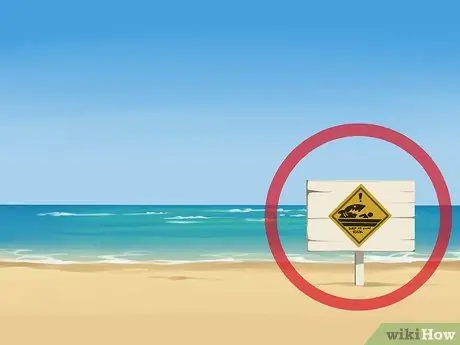- Author Jason Gerald gerald@how-what-advice.com.
- Public 2023-12-16 10:50.
- Last modified 2025-01-23 12:04.
Although very rare, the possibility of meeting a shark while surfing is enough to keep some people from surfing. The odds of being attacked by a shark are estimated at 1 in 11.5 million, and only 4 or 5 people worldwide die from shark attacks each year. If you're still worried about encountering one of these predatory marine animals, check out these tips to help. You further reduce the chances of encountering a shark.
Step
Method 1 of 3: Choosing a Safe Place to Surf

Step 1. Avoid areas where sharks usually forage
There are obvious places, such as near fishing boats or fishing boats, where lots of bait, injured fish, fish blood and intestines can attract sharks. Other areas that may be dangerous include:
- River mouths and channels. This is a place where food, animal carcasses and fish move into the sea downstream, making it a great place for sharks to roam around.
- Areas where waste mixes with water. The waste will attract fish, which will eventually attract sharks.
- A deep water channel, near a sandbar, where coral or sand flows steeply. Sharks lurk in this area to catch fish that swim into shallow waters.
- Where large groups of shark prey are located. If there are seal pups or other marine animal populations nearby, sharks may be hunting nearby and could easily mistake you for prey.

Step 2. Look for warning signs
If a shark has been seen recently, there is usually a warning posted on the beach - heed the warning. If the beach is closed, come back another day.

Step 3. Stay out of the water during peak hunting seasons
Sharks generally forage at dawn, dusk, and at night, so choose a time of day or morning.

Step 4. Avoid cloudy water
Most shark attacks occur because sharks mistake surfers for prey animals. Vision is low in cloudy conditions, so sharks are more likely to mistake you for a seal and attack you.
The water can become very cloudy after a storm or heavy rain. Rain can also make small fish out and attract sharks

Step 5. Consider surfing in an area full of seaweed
Some sharks, especially adult great white sharks, tend to avoid seaweed stockpiles.

Step 6. Take a break in October
Again, it's highly unlikely you'll see a shark, but some experts believe some sharks migrate closer to land during October, possibly giving birth. So if you're really nervous about the prospect of meeting a shark, it's probably best to wait until November to get back to swimming.
Method 2 of 3: Surf Safely

Step 1. Surf with friends
Instead of surfing alone, surf with a friend or a group of people. Shark targets are individuals and do not usually approach people in groups.
Surfing with a friend will increase the chances of your own safety if a shark that rarely appears does eventually emerge. Most people fall victim to shark attacks because they don't get help fast enough. A friend who can help you out of the water and alert the lifeguard can save your life

Step 2. Avoid looking like prey
Sharks are color blind, but can see contrasting colors (such as black and white swimsuits). Shiny objects reflect light and look like fish scales. Avoid wearing jewelry before entering the water and stick to a deep, flat color swimsuit or wetsuit.
- Avoid swimsuits with yellow, orange, white, and flesh colors.
- If you have contrasting dark colors on your body (the skin looks very dark, while the clothes that cover your skin are very white), wear a swimsuit that covers the white areas, so you look one color.

Step 3. Do not enter the water with an open cut or wound
If you get injured while surfing and start to bleed, get out of the water. A little blood in the water can attract sharks from a distance of up to 530 meters.
Some experts also recommend that women take a break from surfing during menstruation. While it's unlikely that sharks will associate menstrual blood with food, other fluids that can excite the shark's curiosity
Method 3 of 3: Meet the Sharks

Step 1. Stay calm
Sharks are attracted to movements in the water--sharks liken those movements to injured prey--and can recognize fear, both of which can make a shark want to attack right away. Try to keep your wits about you so you can make smart decisions and be prepared to defend yourself.

Step 2. Get out of the water
If the shark is nearby and hasn't attacked yet, move towards the shore as quickly and calmly as possible, in a smooth, steady motion.
- Try to keep the shark in your sight at all times.
- If you notice a shark exhibiting aggressive behavior (erratic movement, back bending, or turning rapidly), move as quickly as possible toward a rock, nearby seaweed canopy, or shore.

Step 3. Try using your surfboard as a weapon
Place it between your body and the shark and use it as a shield, protecting the front and sides of your body.
The buoyancy of the surfboard can prevent the shark from dragging you deep into the water, should the shark strike

Step 4. Defend aggressively
If the shark does attack, don't pretend to be dead. Use your surfboard as a weapon. Try to avoid using your hands if possible, as you can hurt your hands from the shark's teeth. Target your punch at the shark's eyes, gills or nose.

Step 5. Get out of the water and seek immediate medical attention if you are attacked
Your life depends on agile medical help. Shout for help, have a friend come to the coast guard and call 119, do whatever it takes to make sure help arrives as soon as possible.
Tips
- Learning how to survive a shark attack might be a good idea, should that happen.
- Do not allow your pet to enter water that is known to be infested with sharks.
Warning
- Don't assume that just because you're swimming with dolphins means you're safe.
- If a shark is near you DO NOT stay in the water, get out of the water calmly and tell the lifeguard if a shark is near the shore.
- Avoid bright colors.
Related article
- Avoiding Sharks
- Survive Shark Attack






